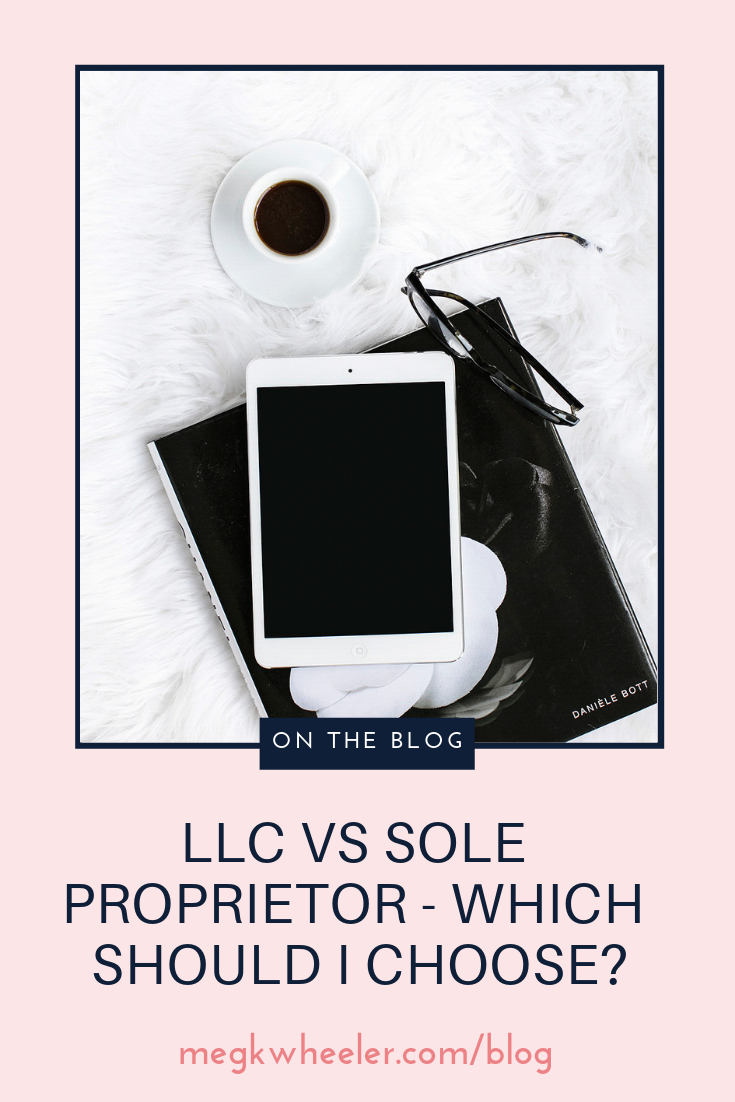LLC vs Sole Proprietor – Which Should I Choose?

The last thing you want to think about when you’re starting a new business is what type of entity to choose. LLC vs sole proprietor? An S-Corp? I don’t even know what either of those is? It’s more fun to dream of the big things you’re going to do with your business. It’s nicer to think about the pretty business cards and the clients banging down your door. The people you’re going to impact; the money you’ll make to travel and buy that house and feel financially secure.
Choosing the right entity type for your business is an important step. Whether you’ve been in business for a while or you’re just starting out, take the time to make sure you’ve made the right decision. Different entity types have different pros and cons and in the long run. Choosing the wrong entity type (or not choosing at all!) can cost you money and maybe even your business.
So what are the options? And how do you choose? Ultimately, which entity you go with is a business decision. I highly recommend you consult with an attorney to make sure you’ve made the right choice. If you want to get started and understand more about the options, read on.
Why Entity Type Matters
Which entity you choose matters for a few reasons. First, certain entity types offer liability protection – meaning that you personally (and therefore your personal assets, such as your house) will not be liable if your business gets sued. Many, but not all, situations offer this liability protection (for example, if you commit fraud, you’re out of luck). Second, the various entity types are all treated differently for tax purposes. So, depending on your business’ profits and a few other factors, you could end up paying more in taxes if you choose the wrong entity.
Lastly, the different entity types all have varying degrees of complexity and administrative burden. Some are very easy to set up and require minimal legal/tax maintenance moving forward, while others require more documentation to set up and more ongoing compliance. So in making this decision, you need to balance the pros of lower taxes and liability protection with the administrative cost and complexity.
Sole Proprietorship
A sole proprietorship is the easiest business structure to adopt and technically is not a legal entity on its own. When one person starts a business and is responsible for the debts of the business, he or she has a sole proprietorship. You don’t need to file any legal documents to create a sole proprietorship (although do note that many towns and states require all businesses, regardless of entity type, to register if you are operating under their jurisdiction).
Most businesses in the U.S. are sole proprietorships and this is likely because they are the simplest to set up and manage. From a tax perspective, the income or loss of the sole proprietorship “rolls up” to the individual owner’s personal tax return; the business itself does not file its own tax return nor does it pay taxes separately. Therefore, the individual owner treats the business’ income as its self-employment income.
The downside of sole proprietorships is that any financial or legal liability is the responsibility of the individual owner. This means that you may lose your personal assets (house, car, savings account, etc.) in the case of a lawsuit, fine, debt or other obligation. And while many small business owners think that it is unlikely they will be sued, remember that any time you interact with the public, either in person or even through your email, website or social media, you are opening up your business to a potential lawsuit. Even if the chances are remote, the consequences can be huge.
General Partnership
When a business has two or more owners, the simplest form is the general partnership. Like the sole proprietorship, the general partnership does not offer personal liability protection; therefore all of the partners are personally liable for the business. Also like a sole proprietorship, general partnerships don’t have much regulation, except there is usually a partnership agreement that outlines certain details about the partnership (such as how much each partner owns of the partnership).
When it comes to taxes, general partnerships are similar to sole proprietorships. The income or loss of the partnership rolls up to each partner’s individual tax return and tax is imposed at the individual’s level, not the partnership level.
One additional point about general partnerships – not only does each partner have personal individual liability for the partnership, but they also have what’s called joint liability – meaning each partner is responsible for the entire business, not just their portion.
Limited Liability Corporations
Not loving the idea of losing your house if your coaching business gets sued? I get it. That’s why you might want to consider a limited liability corporation (LLC). An LLC is a legal entity type and you form one by registering with the state and filing Articles of Incorporation. Typically there is a fee associated with creating your LLC (it varies by state). You may also want to hire an attorney to draft the required paperwork (although this is not required). Many LLCs also have an operating agreement, which outlines how the business will be.
An LLC with only one member (owner) is a “single-member LLC”. The owner of a single-member LLC has personal liability protection, unlike the sole proprietor. This means that in most cases their personal assets will not be at risk if the business is sued. Note, you lose this protection in certain situations such as fraud, personal guarantees, and wrongdoing.
Single-Member LLCs pay taxes similar to the sole proprietor. The profits/losses roll up to the individual owner’s tax return and the individual pays taxes on that income. Like the sole proprietor, the owner of a single-member LLC is subject to self-employment tax.
C Corporations
A C Corporation (C Corp) is the most complex entity type, and is not often right for most small businesses. The main benefit of the C Corporation is that it offers personal asset protection, much like the LLC. Unlike an LLC, a C Corp pays its own taxes, while its owners pay tax on their distributions from the company. This is why we refer to C Corps as being subject to “double taxation.”
C Corps have benefits – additional tax deductions, a lower starting tax rate and the ability to issue stock to attract investors. However, the complexity and cost of having a C Corp often doesn’t make sense. Plus, corporations that mainly provide services are limited so its owners are not able to lower tax on what is essentially their salaries.
S Corporations
The last entity type to consider is an S Corporation (S Corp). An S Corp is technically only a “tax” entity – it is NOT a separate legal entity type. A C Corp or an LLC can become an S Corp for tax purposes after it makes an election with the IRS.
The biggest benefit to an S corp is the tax benefit. Like an LLC, all of the S corp’s profits and losses pass through to its shareholders (you!) to pick up on your individual tax returns. With the exception of certain built-in gains and passive income, the S corp doesn’t pay any tax at the entity level, so unlike a C corp, it’s not subject to double taxation. After paying yourself a “reasonable salary,” all profits you distribute from the S corp are not subject to self-employment tax, like they would be if you were a sole proprietor or an LLC. Therefore, if you are making enough money to pay yourself and then some, an S corp could offer a nice tax savings.
The downside to an S Corp is the limits on who can own an S Corp. Unlike with C Corps and LLCs, S Corp owners must be legal residents of the U.S. Additionally, an S Corp cannot have more than 100 shareholders, and they must be individuals (not other corporations). Lastly, because the S Corp offers tax benefits, its actions are often under closer scrutiny by the IRS. Failing to file correctly or any other tax misstep could jeopardize the S Corp status.
Note that if you want to get S corp status, you must file a form with the IRS no more than 2 months and 15 days after the beginning of the tax year in which you want the election to take effect. More details on filing for S corp status can be found here.
Which Entity to Choose?
Ultimately, you should consult with your attorney and Certified Public Accountant (CPA) before choosing an entity type. But if you’re thinking – I don’t have an attorney? I can’t afford a CPA! I get it. In making your decision, consider these factors:
- Is this a hobby or a business you are taking seriously?
- What is your risk of being sued? Remember, you can be sued for all sorts of things, from failing to pay to someone slipping and falling.
- Are you prepared and able to pay the ongoing costs of maintaining an LLC or C Corp? Consider the additional tax and/or legal compliance those entity types require.
- How comfortable are you taking the risk of losing your personal assets to save on administrative costs and burden?
NOT SURE WHERE TO START TO GET ALL THE “MONEY STUFF” SET UP IN YOUR NEW BIZ?
Get access to ALL of my FREE templates, checklists, resources and guides all in one place in the Biz Money Library!
